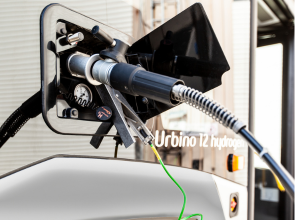Chinese companies are raising their bets on hydrogen in the mobility sector
The mobility sector has seen more activity recently, driven by decarbonisation drive

Several leading Chinese companies have recently announced their plans for developing hydrogen and fuel cell technology with the ambition to expand their plan even to outside China.
China International Capital Corporation Limited (CICC), the first joint-venture investment bank in China, held a Carbon Neutrality 2060 Forum in Beijing on 23 -24 March. CICC said that the Chinese energy sector to achieve carbon neutrality in 2060 by raising the clean electricity proportion to 70% of the total energy demand, 8% with green hydrogen, and 22% with other energy sources supported by carbon capture technologies.
Demand for hydrogen is expected to rise in China. The China Hydrogen Energy Alliance anticipates that by 2050, China’s annual hydrogen consumption will reach about 60 million tonnes/year, helping the country reduce 700 million tonnes from its carbon dioxide emissions.
Great Wall Motor, China’s largest SUV producer, announced this week that it would launch its first hydrogen fuel cell SUV this year. It also wants to see itself in the top three hydrogen fuel cell automakers globally over the next three years. The automaker also set a goal to launch a fleet of 100 hydrogen-powered heavy trucks for this year. Wei Jianjun, the chairman of FTXT Energy Technology Co Ltd (a subsidiary of Great Wall Motor and responsible for hydrogen fuel-cell vehicle technologies), said that Great Wall has been working on the technology for five years and invested 2 billion yuan (US$ 305 million). It plans to invest 3 billion yuan (US$ 460 million) over the next three years in developing hydrogen fuel cell technologies and launching its first hydrogen fuel cell SUV model by the end of this year.
Great Wall Motor is not alone with its strategy for fuel cell vehicles in China. Saic Motor, China’s largest car manufacturer, announced in September 2020 to gain 10% of the hydrogen market by 2025 with the launch of ten new fuel cell vehicles models. Furthermore, early this month, Hyundai Motor Group held a virtual groundbreaking ceremony for HTWO Guangzhou, the Group’s first fuel cell system facility outside Korea. The project will be completed in the second half of 2022. The facility’s annual production target is 6,500 units to gradually expand production capacity in line with Chinese market conditions and central government policies.
Meanwhile, on 29th March, Beijing SinoHytec Co. Ltd. and Toyota Motor Corporation established a joint venture company Toyota Sinohytec Fuel Cell (FCTS), in China to promote the commercial vehicle fuel cell system business. The new JV company will produce and sell fuel cells developed by United Fuel Cell System Research and Development (Beijing) Co., Ltd. (FCRD), which was established as a JV in August 2020 in partnership with Yihuatong, Toyota, and four other automakers. The fuel cell system will be based on Toyota’s hydrogen fuel cell vehicle Mirai. The output power will be increased in FCRD to be suitable for commercial vehicles. The new company will officially start producing fuel cell systems and stacks in the Beijing Economic and Technological Development Zone in 2023.
Sany, a major construction equipment manufacturer in the world, announced on 26th March that it rolled out a dump truck and a mixer truck equipped with hydrogen fuel cell technology. It said its mixer truck is the first hydrogen-powered mixer truck in the world. The vehicles come with a set of hydrogen cylinders with a combined capacity of 1,680 L, ensuring a driving distance of more than 500 km. They also have a large torque drive motor and an AMT gearbox, and the high-power fuel cell stack features an energy conversion rate of over 50%. The vehicles are also integrated with a heat management system that performs automatic heating and cooling in hot and cold weather conditions to maintain optimal performance. Sany plans to become the largest comprehensive hydrogen fuel solution provider and the number one electric construction vehicle manufacturer in China over the next five years.
On the other hand, Sinopec, the Chinese state-owned oil producer, reiterated its views on Monday (29th March) to construct 1,000 hydrogen or oil-hydrogen refuelling stations in China by the end of 2025. It also aims to reach carbon neutrality by 2050, which would be ten years ahead of China 2060 net-zero emissions target set last September by China’s President Xi Jinping.
